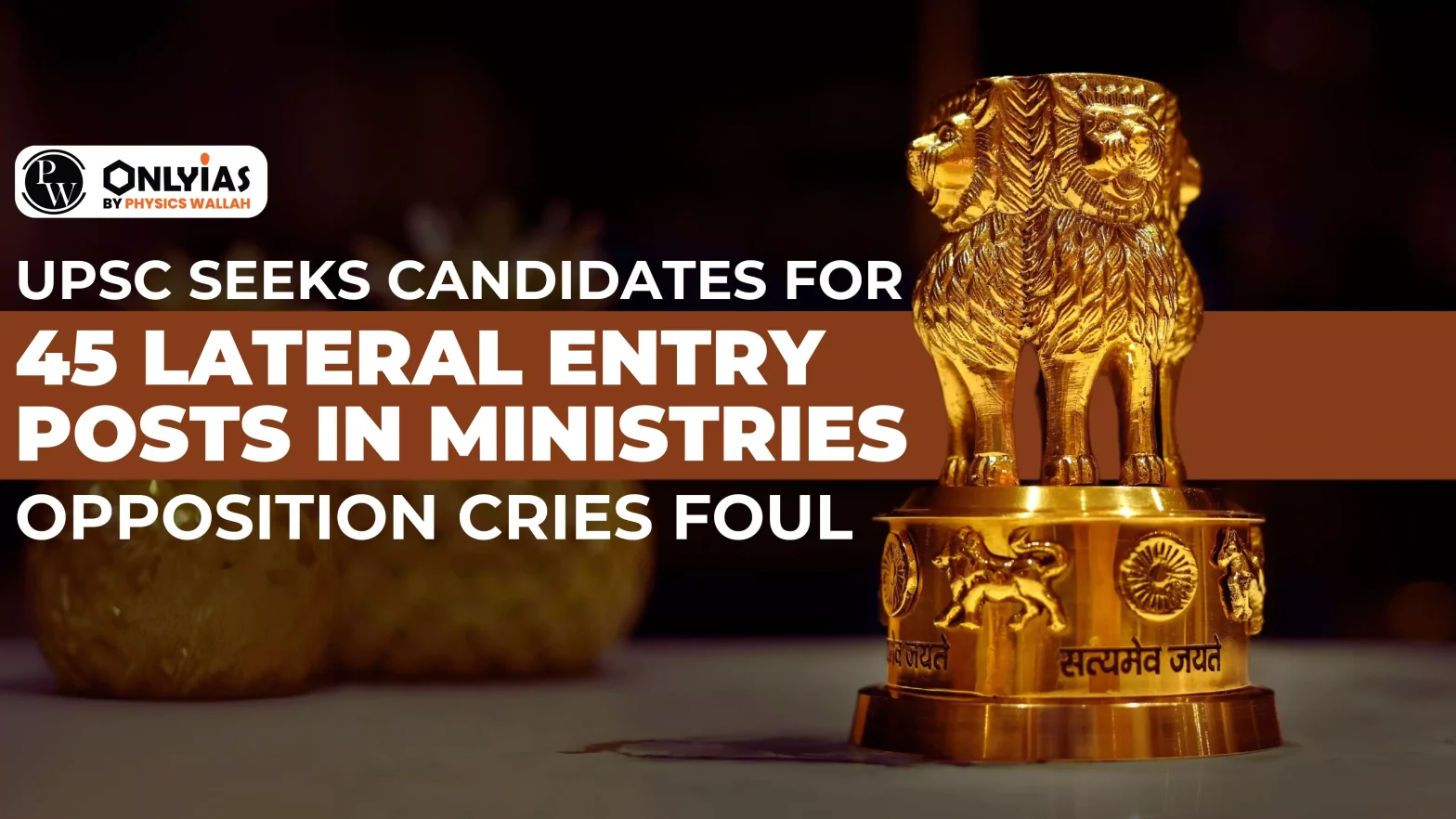The Union Service Public Commission recently sought applications for lateral entry from the private sector, state/UT government and PSU employees for 45 posts of Joint Secretary, Director and Deputy Secretary across 24 Central Ministries, which will be filled on a contract basis. This move has been criticised by the opposition parties as a “well-planned conspiracy” to keep out reservations in senior Union government posts.
| Concept:
Two types of bureaucracy:
- Generalist Bureaucracy: Generalist bureaucracy involves officials with a broad skill set that allows them to adapt to various roles and departments, providing flexibility for transfers across different government sectors. These generalists focus on implementing policies with a comprehensive understanding of government functions.
E.g., IAS Officers
- Specialist bureaucracy: It comprises officials with deep knowledge in specific fields such as finance, health, or engineering. Specialists are primarily assigned to roles requiring technical skills, focussing on providing expert advice and technical solutions within their domain. This model requires specialised education and continuous professional development to maintain proficiency in a particular field.
E.g., officers in finance, health and engineering departments, the government has brought specialists such as Nandan Nilekani for implementation of Aadhaar Cards , Raghuram Rajan in RBI, etc.
|
Lateral Entry
It refers to the appointment of professionals from the Private Sector or Public Sector Undertakings (PSUs) directly into mid and senior-level positions in the Indian bureaucracy, typically at the level of Joint Secretary, Director, or Deputy Secretary.
Lateral entry candidates are usually selected based on their experience, qualifications, and performance in interviews rather than through competitive exams.
Enroll now for UPSC Online Course
| Argument about Impact on Reservations:
Undermining Reservation Quotas: The reservation system in India is designed to provide equitable opportunities for historically marginalised communities, including Scheduled Castes (SCs), Scheduled Tribes (STs), and Other Backward Classes (OBCs) along with Economically Weaker Section (EWS).
Lateral entry positions, which are often filled by people from outside the regular civil services, might bypass these reservations. This can potentially reduce the representation of reserved categories in key administrative positions, undermining the intent of the reservation policy. |
Why is there a need for lateral entry?
- Technical Expertise: Domain experts offer crucial insights and challenges for effective policy formulation and implementation.
- Complexity of Administration: Growing complexity and technical nature of administrative functions necessitate specialist knowledge for effective handling.
- New Perspectives: Lateral entry can introduce diverse perspectives and expertise into the bureaucracy, which might lead to more effective governance. E.g., Nandan Nilekani for Adhaar Implementation.
- Healthy competition within bureaucracy: Existing bureaucracy will be motivated to perform and update to compete with the lateral entrants.
- Field Reality Awareness: E.g., arts-educated IAS officers may struggle with comprehending cyber security challenges.
- Increase in Efficiency: Lateral entrants can bring positives of corporate culture to bureaucracy.
- Governance Enhancement: NITI Aayog’s Three-Year Action Agenda aims to enhance competitiveness within the career bureaucracy, improving governance and performance.
- Talent Retention: Lateral entry, as suggested by the Sixth Central Pay Commission (2006), ensures talent entry and retention in government, especially for high-demand sectors previously dominated by the private sector.
Check Out UPSC CSE Books From PW Store
Arguments against Lateral Entry
- Lack of field experience: External talent may lack the practical field experience essential in civil service roles, such as understanding the social impacts of economic policies.
- Profit-driven Motives: The private sector works on profit-based motives while the government is focused on larger public good rather than profits.
- Instances of Failure: Even the domain experts at times have failed miserably. E.g., the case of Air India.
- Internal Conflicts: institutionalised civil servants operating efficiently may see their morale affected by lateral entry, potentially undermining their role and effectiveness. It could lead to conflict between existing bureaucrats and lateral entrants.
- Political Neutrality: There is a possibility of bias among the lateral entrants towards the government, which brought them.
- Possibility of Favoratism in Selection: Due to the lack of fixed criteria for selecting the lateral entrants, there is a possibility of nepotism or favouritism in onboarding lateral entrants.
- Collusive Corruption: There is a possibility that the person may take decisions or make policies favouring organisations where he worked earlier in the private sector.
- Impact on Reservation: As the rules of reservation are not applicable on lateral entries, representatives and opportunities to be provided by reservations in exams cannot be ensured in lateral entries.
- Lack of long-term vision: Due to short tenure or volatility in employment, lateral entrants may not have long-term vision for the role they are looking into. In such cases, there will be a loss of institution memory, which traditional bureaucrats carry and pass on to juniors.
Recommendations of Various Expert Groups/Committees regarding Lateral Entry
- 1st ARC: Highlighted that performance appraisals may be adopted from the armed forces, which could aid in weeding out non-performers.
- SurinderNath Committee (2003) and Hota Committee (2004): There is a need for domain expertise in services.
- 2nd ARC: In 2005, the second Administrative Reforms Commission (ARC) recommended lateral entry at both the central and state levels.
Earlier instances of lateral entrants: Nandan Nilekani, Montek Singh Ahluwalia, Vijay Kelkar, Arvind Subramanian, and Raghuram Rajan.
Enroll now for UPSC Online Classes
Way Forward
- Prioritise internal creativity and rigorous performance evaluation over external leadership and lateral entry.
- Encouraging domain expertise in existing bureaucracy after certain years of service.
- Reform India’s civil service with safeguards against political interference and specialised career paths.
- The government can take the help of consulting firms and field experts as advisors in case of requirement rather than lateral entry.
- Use lateral entry selectively for mission-driven projects, blending private sector expertise with government employees.
![]() 19 Aug 2024
19 Aug 2024

